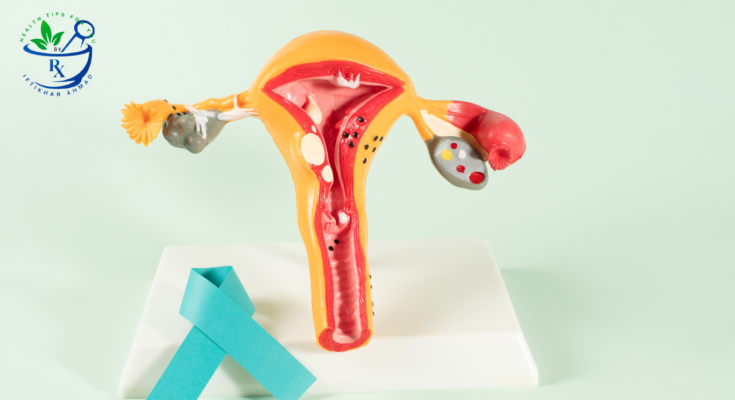Polycystic Ovary Syndrome (PCOS) is a renowned disease that affects numerous ladies of their reproductive age. It plays a very important part in determining the health, wellbeing and fertility of any woman. But, it is important to know that PCOS can be managed if proper care is taken in handling the condition. This article looks at the symptoms, cure, and home remedies of Polycystic Ovary Syndrome while embracing a positive mindset towards healthy living.
What is Polycystic Ovary Syndrome (PCOS)?
PCOS is defined by the existence of multiple small cysts in the ovaries, irregular menstrual cycles and abnormally high androgen levels. It can cause different manifestations, such as overweight, pimples, increased body hair (hirsutism), and issues with fertility.
Causes of PCOS
- Genetics: PCOS is often seen to be hereditary which indicates the genetic factor behind its development.
- Insulin Resistance: Most women with PCOS have a problem called insulin resistance – the body’s inability to use the hormone properly. This can accumulate and cause high blood glucose levels, and ultimately, type 2 diabetes.
- Hormonal Imbalance: PCOS is often characterized by an overload of hormones; that is, androgens.
- Inflammation: As mentioned earlier, low-grade inflammation is present in women with PCOS and may be a factor of insulin resistance and other manifestations.
Symptoms of PCOS
PCOS can present itself in different ways and may range from mild to severe. Common symptoms include:
- Absent or infrequent menstruation or unpredictable periods
- Difficulty getting pregnant
- This condition is characterized by overdevelopment of hair particularly on the face, chest, back and other parts of the body.
- Obesity and inability to lose weight
- Oily skin or acne .
- Hair loss or thinning hair on the scalp
Conventional Treatments for Polycystic Ovary Syndrome (PCOS)
Conventional treatment of PCOS includes use of medications in conjunction to lifestyle changes. The main objectives are to alleviate some symptoms and prevent possible serious consequences, including the second type of diabetes and atherosclerosis.
- Lifestyle Changes: Lifestyle modifications such as adopting a healthy diet and exercising regularly are essential for individuals with PCOS. Losing weight can reduce symptoms and properly organize the menstrual cycle.
- Medications: The following drugs can be prescribed to alleviate the condition associated with PCOS.
- Birth Control Pills: These control the menstrual cycles, decrease the levels of androgens, and facilitate removal of acne.
- Metformin: It also increases your body’s insulin sensitivity and can aid in weight loss and regulating the menstrual cycle.
- Anti-Androgens: Spironolactone is one of the medicines that may help to decrease hair growth and acne.
- Fertility treatments include using clomiphene citrate, letrozole, and in vitro fertilization (IVF) for infertility.
Herbal and Natural Remedies for Polycystic Ovary Syndrome (PCOS)
A lot of women prefer using home remedies for the treatment of PCOS and its symptoms. Patients should use these approaches in combination with traditional treatments to enhance their quality of life.
- Diet and Nutrition: In managing PCOS, experts recommend consuming healthy, nutrient-dense foods. Key dietary recommendations include:
- Low Glycemic Index Foods: Low glycemic index diets which include unprocessed foods like whole grains, fruits, and vegetables.
- Anti-Inflammatory Foods: The berries, fatty fish, and leafy green foods that are rich in antioxidants and omega-3 fatty acids.
- Adequate Protein: Protein is beneficial in preserving muscles and also contributes to weight control.
- Exercise: Importantly exercise can increase insulin levels, promote weight loss, and boost mood. Try and include at least 30 minutes of moderate physical activity on all the days of the week.
- Herbal Supplements: Experts deem several herbal supplements effective in treating PCOS.
- Cinnamon: May have positive effects on insulin sensitivity and may help regulate menstrual cycles.
- Spearmint Tea: Lowers androgen levels and ameliorates hirsutism.
- Inositol: One of the B vitamins that can enhance insulin resistance and fertility in women.
- Stress Management: Stress adversely affects PCOS. Engaging in activities such as yoga, meditation, and mindfulness can significantly aid in reducing stress.
- Sleep: Proper sleep is crucial for hormone balance and overall bodily function. Therefore, aiming for 7 to 9 hours of healthy sleep each night is advisable.
Living a Healthy Lifestyle with Polycystic Ovary Syndrome (PCOS)
Lifestyle modification is the first principle of managing PCOS.
- Stay Active: Include physical activity in your regular routine. It can be as mundane as going for a walk, signing up for a dance class or even doing yoga.
- Eat Mindfully: Avoid processed foods and choose foods that remain close to their natural state. Reduce the intake of foods rich in sugars and fats since they can make the insulin resistance worse.
- Monitor Your Health: Your healthcare provider recommends scheduling checkups regularly to monitor your health. Moreover, it’s advisable to keep a record of your symptoms and promptly report any changes to your doctor.
- Support System: One needs to have positive and encouraging friends and or relatives. Perhaps, you could consider joining a support group of women who also suffer from PCOS.
- Educate Yourself: Education on the subject of PCOS is crucial, providing you with the necessary knowledge to make informed decisions regarding your health.
Conclusion
By implementing effective strategies, the management of Polycystic Ovary Syndrome (PCOS) becomes attainable. Additionally, for various other conditions, combining conventional treatments with natural remedies and lifestyle adjustments can significantly reduce symptoms and enhance overall health. Moreover adopting a healthy lifestyle, including regular exercise, a balanced diet, and mindfulness towards mental well-being, is crucial. Generally, it’s important to remember that PCOS affects many others as well, and with proper guidance and information, individuals can effectively manage the condition.





